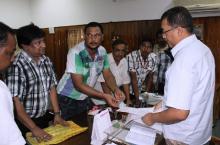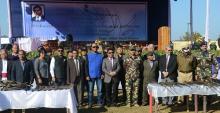Loosing the important ballot race in the constituent assembly for the 'head of the state' and his subordinate, the rebellion communists of Nepal has decided not to form the government. The Maoist backed candidates were rejected by the lawmakers, which indicates that a Maoist government would face a constant threat of toppling by the combined oppositions. In fact, emergence of a three party alliance, opposing the Maoists, has compelled the Maoist leader Prachanda, who was earlier projected as the prime minister of the new Himalayan democratic republic, to rethink about his next step.
Prachanda, whose real name is Pushpa Kamal Dahal, led a bloody revolution to dethrone the then Hindu monarchy. And for many weeks after the April 10 general election (to form the constituent assembly), where his party (the Communist Party of Nepal-Maoist) scored highest number of seats, everything went smoothly. In the polls, the Maoists won 220 seats, who were followed by Nepali Congress (110 members) and Communist Party of Nepal - Unified Marxist Leninist (103 members).
It was that time, when the Maoists demanded both the posts of president and prime minister for them. But soon they faced the heat of democracy, when the other political parties rejected their demand out rightly. The Maoists then left their claim (for the post of president), but sticked to the post of an executive prime minister (which was reserved for Prachanda).
Initially, Nepali Congress projected its leader and the acting Prime Minister GP Koirala as the candidate for the first president of Nepal, who would replace the king as the head of the state. But Prachanda rejected the proposal, because he feared that a senior politician like Koirala as the president would invite troubles for him (as the prime minister). Of course, Prachanda described Koirala as a statesman and a national figure of Nepal. But he preferred Koirala to keep away from any heavy responsibility because of Koirala's age (he is over 80) and fragile health.
Following the mounting pressure from the Maoists, Koirala has also resigned from the office of the prime minister and is waiting to submit his resignation letter to the newly elected president of Nepal. Earlier his resignation letter would have been sent to the king. Mentionable that Nepal constituent assembly declared the country as a democratic republic in May and even asked the last king Gyanendra to leave the Narayanhiti palace, which was later converted into a museum.
The presidential and the vice presidential race in the constituent assembly has, however, paved the way for an alliance of three political parties opposing the Maoists. During the July 19 polls in the assembly, Maoists faced the first defeat, when their candidate Shanta Shrestha lost to Paramananda Jha, a Madhesi Janadhikar Forum (Madhesi People's Rights Forum) candidate for the post of vice president. Jha, 73 bagged 305 votes in the 601-member constituent assembly to get elected for the honourable post.
The Madhesi community, who lives in southern Nepal that is adjacent to India, emerged as a visible political power after the general election and the community enjoyed an ample space for political bargaining with the Maoists. Possessing nearly 40 per cent population of Nepal (total populace 27 million), Madhesis are primarily demanding an autonomous status in their locality.
The polls for president could not be completed as no one gained the minimum required number (301) of votes on Saturday (July 19). The final round of polls held on Monday (July 21), where Ram Baran Yadav, 61 was declared elected as the first President of Nepal. Yadav, also a Madhesi candidate won the support from 308 members in the assembly. Supported by the Nepali Congress and the Communist Party of Nepal - Unified Marxist Leninist defeated the Maoists backed candidate Ram Raja Prasad Singh, 74.
It happened because of a last minute alliance among the Nepali Congress, the Communist Party of Nepal - Unified Marxist Leninist and the ethnic Madhesi People's Rights Forum to confirm the defeat of Maoist backed candidate. They had earlier succeeded in defeating the Maoist candidate in the vice-presidential race also.
The new alliance has planned to continue their tie-up till fighting for the post of chairman of the constituent assembly. Even Prachanda himself had come out recently terming the alliance (Nepali Congress, Communist Party of Nepal - Unified Marxist Leninist and Madhesi People's Rights Forum) as 'unholy'.
And finally, Maoists had decided not to stack clam for the government. After the central committee meeting of the party, Prachanda told news persons at Kathmandu that they would not go for the government, rather sit in the opposition. It simply indicate more delay in formation of the government at Kathmandu and more political uncertainties looming over Nepal in the coming days.
Prachanda, whose real name is Pushpa Kamal Dahal, led a bloody revolution to dethrone the then Hindu monarchy. And for many weeks after the April 10 general election (to form the constituent assembly), where his party (the Communist Party of Nepal-Maoist) scored highest number of seats, everything went smoothly. In the polls, the Maoists won 220 seats, who were followed by Nepali Congress (110 members) and Communist Party of Nepal - Unified Marxist Leninist (103 members).
It was that time, when the Maoists demanded both the posts of president and prime minister for them. But soon they faced the heat of democracy, when the other political parties rejected their demand out rightly. The Maoists then left their claim (for the post of president), but sticked to the post of an executive prime minister (which was reserved for Prachanda).
Initially, Nepali Congress projected its leader and the acting Prime Minister GP Koirala as the candidate for the first president of Nepal, who would replace the king as the head of the state. But Prachanda rejected the proposal, because he feared that a senior politician like Koirala as the president would invite troubles for him (as the prime minister). Of course, Prachanda described Koirala as a statesman and a national figure of Nepal. But he preferred Koirala to keep away from any heavy responsibility because of Koirala's age (he is over 80) and fragile health.
Following the mounting pressure from the Maoists, Koirala has also resigned from the office of the prime minister and is waiting to submit his resignation letter to the newly elected president of Nepal. Earlier his resignation letter would have been sent to the king. Mentionable that Nepal constituent assembly declared the country as a democratic republic in May and even asked the last king Gyanendra to leave the Narayanhiti palace, which was later converted into a museum.
The presidential and the vice presidential race in the constituent assembly has, however, paved the way for an alliance of three political parties opposing the Maoists. During the July 19 polls in the assembly, Maoists faced the first defeat, when their candidate Shanta Shrestha lost to Paramananda Jha, a Madhesi Janadhikar Forum (Madhesi People's Rights Forum) candidate for the post of vice president. Jha, 73 bagged 305 votes in the 601-member constituent assembly to get elected for the honourable post.
The Madhesi community, who lives in southern Nepal that is adjacent to India, emerged as a visible political power after the general election and the community enjoyed an ample space for political bargaining with the Maoists. Possessing nearly 40 per cent population of Nepal (total populace 27 million), Madhesis are primarily demanding an autonomous status in their locality.
The polls for president could not be completed as no one gained the minimum required number (301) of votes on Saturday (July 19). The final round of polls held on Monday (July 21), where Ram Baran Yadav, 61 was declared elected as the first President of Nepal. Yadav, also a Madhesi candidate won the support from 308 members in the assembly. Supported by the Nepali Congress and the Communist Party of Nepal - Unified Marxist Leninist defeated the Maoists backed candidate Ram Raja Prasad Singh, 74.
It happened because of a last minute alliance among the Nepali Congress, the Communist Party of Nepal - Unified Marxist Leninist and the ethnic Madhesi People's Rights Forum to confirm the defeat of Maoist backed candidate. They had earlier succeeded in defeating the Maoist candidate in the vice-presidential race also.
The new alliance has planned to continue their tie-up till fighting for the post of chairman of the constituent assembly. Even Prachanda himself had come out recently terming the alliance (Nepali Congress, Communist Party of Nepal - Unified Marxist Leninist and Madhesi People's Rights Forum) as 'unholy'.
And finally, Maoists had decided not to stack clam for the government. After the central committee meeting of the party, Prachanda told news persons at Kathmandu that they would not go for the government, rather sit in the opposition. It simply indicate more delay in formation of the government at Kathmandu and more political uncertainties looming over Nepal in the coming days.






Add new comment